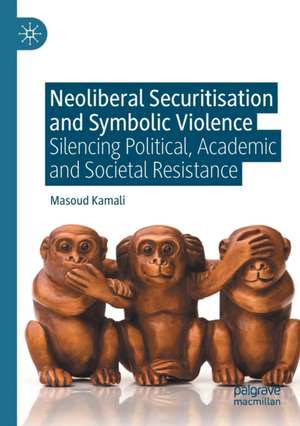Neoliberal Securitisation and Symbolic Violence: Silencing Political, Academic and Societal Resistance
Autor Masoud Kamalien Limba Engleză Paperback – 26 apr 2022
| Toate formatele și edițiile | Preț | Express |
|---|---|---|
| Paperback (1) | 886.92 lei 6-8 săpt. | |
| Springer International Publishing – 26 apr 2022 | 886.92 lei 6-8 săpt. | |
| Hardback (1) | 891.96 lei 6-8 săpt. | |
| Springer International Publishing – 25 apr 2021 | 891.96 lei 6-8 săpt. |
Preț: 886.92 lei
Preț vechi: 1081.62 lei
-18% Nou
Puncte Express: 1330
Preț estimativ în valută:
169.73€ • 184.30$ • 142.58£
169.73€ • 184.30$ • 142.58£
Carte tipărită la comandă
Livrare economică 23 aprilie-07 mai
Preluare comenzi: 021 569.72.76
Specificații
ISBN-13: 9783030712129
ISBN-10: 3030712125
Ilustrații: XIII, 254 p. 1 illus.
Dimensiuni: 148 x 210 mm
Greutate: 0.33 kg
Ediția:1st ed. 2021
Editura: Springer International Publishing
Colecția Palgrave Macmillan
Locul publicării:Cham, Switzerland
ISBN-10: 3030712125
Ilustrații: XIII, 254 p. 1 illus.
Dimensiuni: 148 x 210 mm
Greutate: 0.33 kg
Ediția:1st ed. 2021
Editura: Springer International Publishing
Colecția Palgrave Macmillan
Locul publicării:Cham, Switzerland
Cuprins
Chapter 1. Introduction.- Chapter 2. Theoretical Perspective.- Chapter 3. Securitisation and self-censorship in mainstream political parties.- Chapter 4. Securitisation and self-censorship in mainstream mass media.- Chapter 5. Securitisation and self-censorship in academia.- Chapter 6: Securitisation and self-censorship in civil society.- Chapter 7: Conclusions.
Recenzii
“The book is easy to read and is very enlightening by exposing the previously hidden underbelly of a phenomenon that is rarely brought to the surface, let alone exposed to a systematic analytical academic approach. … It is highly recommended to read as it provides an apt analysis of how the neo-liberal world … transforms politically, socially, economically as it is subjected to crises and challenges by non-establishment forces.” (Greg Simons, Global Affairs, October 3, 2021)
Notă biografică
Masoud Kamali is Professor of sociology and social work. He has been appointed by the Swedish government as the head of the ‘Governmental Inquiry into Power, Integration and Structural Discrimination’. He has also been the scientific leader of the major European research project “European Dilemma: Institutional Patterns and Politics” which resulted in many international publications by researchers from eight EU member states.
Textul de pe ultima copertă
This book explores the consequences of the last three decades’ substantial neoliberal securitisation of freedom of speech, democracy and social security of racialised groups. Its empirical material contains in-depth interviews with racialised politicians, journalists, academics and civil society activists in Sweden. Like many other countries, Sweden has combined a neoliberal reorganisation of society with securitisation policies in which ‘the war on terror’ has played a central role. In order to understand the complexity of neoliberal securitisation policies and the analysis of the empiric material, the study makes use of central theoretical concepts, such as ‘the spiral of silence’, ‘symbolic violence’, ‘governmentalisation’ and ‘neoliberal racism.’ It will be of particular interest to students and scholars of political sociology, social policy and social work.
Masoud Kamali is Professor of sociology and social work. He has been appointed by the Swedish government as the head of the ‘Governmental Inquiry into Power, Integration and Structural Discrimination’. He has also been the scientific leader of the major European research project “European Dilemma: Institutional Patterns and Politics” which resulted in many international publications by researchers from eight EU member states.
Masoud Kamali is Professor of sociology and social work. He has been appointed by the Swedish government as the head of the ‘Governmental Inquiry into Power, Integration and Structural Discrimination’. He has also been the scientific leader of the major European research project “European Dilemma: Institutional Patterns and Politics” which resulted in many international publications by researchers from eight EU member states.
Caracteristici
Brings together an interest in neoliberalism studies and security studies to address the issues of free speech and racism in three distinct sectors in Sweden Provides an empirical focus on political parties, policies, academic activities and civil society activism Expands the analysis beyond the Swedish context, whilst also using the Swedish case as an important example of a supposed stronghold of democracy and equal rights
